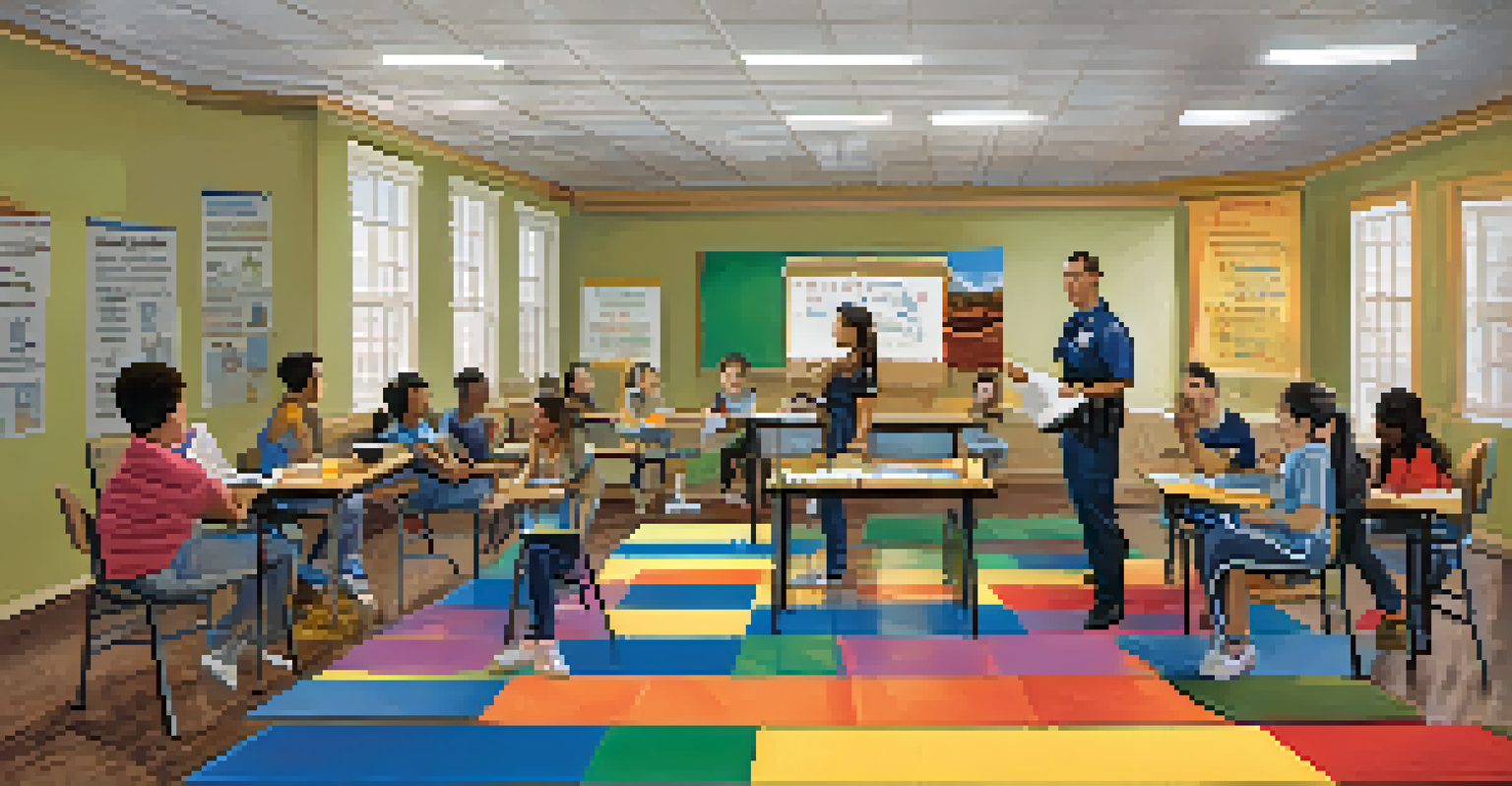The Role of Schools in Promoting Self Defense Awareness

Understanding Self-Defense: A Crucial Life Skill
Self-defense isn't just about physical combat; it’s about awareness and prevention. Schools play a vital role in teaching students how to recognize potentially dangerous situations. By understanding the principles of self-defense, students can respond effectively and confidently when faced with threats.
The best defense is a good offense.
Moreover, self-defense education fosters a sense of empowerment among students. It equips them with the knowledge that they have the ability to protect themselves if necessary. This newfound confidence can positively impact other areas of their lives, from academics to personal relationships.
Integrating self-defense into the curriculum can also help demystify the topic. When students learn that self-defense is not just about fighting back, but also about avoiding conflict, they gain a more well-rounded understanding of safety and personal responsibility.
Creating a Safe Environment for Learning
A safe learning environment is fundamental to academic success. By promoting self-defense awareness, schools can help students feel more secure on campus. This sense of safety can encourage greater participation in classroom activities and social events.

Furthermore, when students feel safe, they are more likely to focus on their studies rather than worrying about potential threats. Schools that prioritize self-defense awareness demonstrate their commitment to student well-being. This proactive approach can help cultivate a positive school culture.
Self-Defense Empowers Students
Teaching self-defense equips students with confidence and skills to protect themselves, positively impacting their academic and personal lives.
Encouraging open discussions about safety tactics can also help students build trust with their teachers and peers. When students know they can talk about their concerns, it fosters a supportive community that values each individual's safety.
Incorporating Self-Defense Training into Curricula
Integrating self-defense training into school curricula can be highly beneficial. Classes can include practical techniques and strategies that students can use in real-life situations. This hands-on approach ensures students not only learn theoretically but also gain essential skills.
Self-defense is not just a skill; it's a mindset.
Moreover, schools can collaborate with local martial arts studios or self-defense instructors to provide professional training. Such partnerships can enrich the educational experience and offer students expert guidance. This collaboration also promotes community engagement and support.
Additionally, self-defense training can be adapted for various age groups, making it accessible to all students. By tailoring the content to different maturity levels, schools ensure that every student can participate and benefit from the program.
Building Awareness Through Workshops and Seminars
Workshops and seminars are excellent ways to engage students in self-defense topics. These events can cover various aspects, including situational awareness, personal safety tactics, and anti-bullying strategies. By participating in interactive sessions, students can learn valuable skills while having fun.
Inviting guest speakers, such as law enforcement officers or self-defense experts, can also add credibility to these workshops. Their real-life experiences can motivate students and provide practical insights. Hearing firsthand accounts can make the information more relatable and impactful.
Creating a Safe Learning Environment
Promoting self-defense awareness fosters a sense of security, allowing students to focus on their studies and participate actively in school activities.
Moreover, schools can encourage parental involvement in these events. By educating parents alongside their children, families can reinforce safety lessons at home, creating a holistic approach to self-defense awareness.
Fostering a Culture of Respect and Empowerment
Promoting self-defense awareness contributes to a culture of respect within schools. When students learn about boundaries and consent, they develop a deeper understanding of personal space. This awareness helps reduce bullying and harassment, fostering a more respectful environment.
Empowering students through self-defense education also encourages them to stand up for themselves and others. It cultivates a sense of responsibility and community among students, who learn to look out for one another. This camaraderie can lead to a more supportive school atmosphere.
In addition, teaching self-defense principles encourages students to advocate for themselves. They learn that they have the right to feel safe and to seek help when needed. This empowerment can have lasting effects, promoting positive behaviors that extend beyond school.
Using Technology to Enhance Self-Defense Education
In today's digital age, technology can play a significant role in self-defense education. Schools can utilize online resources, apps, and videos to supplement traditional training methods. These tools can provide students with additional information and support, making learning more engaging.
Moreover, virtual simulations can offer students a safe space to practice decision-making skills in potentially dangerous situations. By navigating scenarios through technology, students can build confidence and learn how to react appropriately without real-world consequences.
Continuous Learning Beyond School
Encouraging ongoing self-defense education empowers students to advocate for safety in their communities and reinforces the skills they’ve learned.
Social media platforms can also be leveraged to share self-defense tips and resources. Creating a dedicated space online allows students to access valuable information and connect with peers who share similar interests in safety and awareness.
Encouraging Continuous Learning Beyond School
The journey of self-defense awareness doesn't end in the classroom. Schools can encourage students to continue learning outside of school by participating in local self-defense classes or community workshops. This ongoing education reinforces the skills they’ve learned and keeps safety top of mind.
Additionally, schools can create partnerships with community organizations that focus on self-defense training. These collaborations can provide students with resources and opportunities to further develop their skills. Such connections also strengthen ties between schools and the local community.

Finally, promoting self-defense awareness can inspire students to become advocates for safety in their communities. By sharing their knowledge and experiences, they can empower others, creating a ripple effect of awareness and preparedness that extends far beyond the school walls.